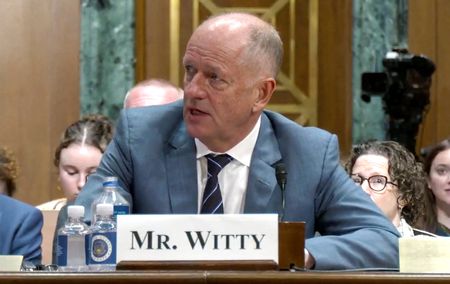By Manas Mishra and Amina Niasse
(Reuters) -The suspect in the murder of UnitedHealth Group executive Brian Thompson was not a customer of the health insurer, a company spokesperson said on Friday.
Ivy League-educated Luigi Mangione was charged with murder on Dec. 9 for the killing of Thompson outside a Manhattan hotel before a company conference, following a five-day manhunt.
Mangione suffered from chronic back pain that affected his daily life, according to friends and social media posts, though it is unclear whether his personal health played a role in the shooting.
UnitedHealth does not have prior records for either Mangione or his mother, the spokesperson said.
Thompson’s murder was met with shock across the industry, as well as an outpouring of anger from Americans struggling with healthcare costs and the complexities of U.S. health insurance. Public officials and healthcare executives have acknowledged the frustrations, but in the last few days have been more vocal in pushing back against social media glorification of an accused killer.
In a New York Times opinion piece on Friday, UnitedHealth Group CEO Andrew Witty said he understood public frustrations with the “flawed” U.S. healthcare system, but mourned Thompson’s killing and decried the “vitriol that has been directed at our colleagues who have been barraged by threats.” Thompson was CEO of the company’s large health insurance business.
The New York Times reported that an internal New York City police report analyzing Mangione’s writings concluded that he viewed the killing as a justified response to what he believed to be corruption in the healthcare industry.
In some circles, Mangione has been celebrated and more than a thousand donations have poured into an online fundraiser for his legal defense.
“It’s representing a widespread anger that is felt by people in the middle class, in the working class and people who are well-to-do who also have trouble with their insurance company,” said Pepper Culpepper, a professor of government and public policy at Oxford University.
ABC News and others reported on Friday that a Florida woman was arrested after she allegedly ended a phone call with a representative from her insurer Blue Cross Blue Shield by saying the words “Delay, deny, depose. You people are next.”
The words “deny,” “defend” and “depose” were carved into shell casings found at the Thompson murder scene, several news outlets reported, evoking the title of a book critical of the insurance industry published in 2010 titled “Delay, Deny, Defend: Why Insurance Companies Don’t Pay Claims and What You Can Do About It.”
‘INTENSELY PERSONAL AND VERY COMPLICATED’
“Health care is both intensely personal and very complicated, and the reasons behind coverage decisions are not well understood,” Witty wrote in his first public comments since the murder, noting that the U.S. healthcare system is a patchwork built over decades.
“We share some of the responsibility for that. Together with employers, governments and others who pay for care, we need to improve how we explain what insurance covers and how decisions are made,” he wrote.
Health insurance companies have come under sharp public scrutiny since Thompson’s Dec. 4 murder, and shares of UnitedHealth alone have fallen nearly 15%.
It isn’t clear if the recent events “represent a watershed moment” that could catalyze change in the industry, said Morningstar analyst Julie Utterback. “You can definitely feel the potential for some kind of change in the air.”
The healthcare sector has reassessed security measures due to an uptick in violent crime the last 18 months, Reuters reported, with UnitedHealth and rivals CVS Health and Cigna removing photos of their leadership from their websites following the shooting.
Instead of boosting security for executives, insurers should manage public perception of their services, said Culpepper, adding that many Americans believe big health insurers refuse to cover needed care in an effort to bolster revenue.
“This sort of ambient discontent around health insurance in the United States will not go away until it starts to be addressed.”
(Reporting by Manas Mishra and Sriparna Roy in Bengaluru and Amina Niasse in New York; Editing by Anil D’Silva, Devika Syamnath and Bill Berkrot)













